If you’ve ever been curious about the bustling hub of activity that many of us have interacted with — the call center — then this is the article you’ve been waiting for. In an industry where the resolution rate on first contact ranges impressively between 70-75%, there’s more than meets the eye.
Thressively between 70-75 is article demystifies the role of call center representatives, offering an in-depth analysis of job descriptions and essential call center agent duties. Additionally, you’ll gain insights into the crucial skills and qualifications required to excel as a call center representative. So whether you’re considering a career within this field, or you simply strive to gain a better understanding of the person at the other end of your line, sit tight, we’ve got a lot to cover.
Table of Contents
- The role of a call center representative
- Call center representative job description
- Detailed breakdown of call center representative duties and agent responsibilities
- Call center representative salary expectations
- Essential skills and qualifications for call center representatives
- Experience requirements for call center representatives
- Education and training tips for call center representatives
- Conclusion
The role of a call center representative
A call center representative, also known as a customer service representative, or a call center agent, plays a critical role in maintaining customer satisfaction and boosting a company’s reputation. They manage customer inquiries and complaints, and provide information about products and services. All of that is done in real-time, on the phone with often a demanding or frustrated customer.
For example, imagine you’re a call center representative for a company that sells home appliances. A customer calls in saying their newly-purchased washing machine isn’t working correctly. You would start by assuring them you’re there to help. You’d ask appropriate questions to better understand the matter. Based on the problem, the solution might be as simple as guiding the customer through re-setting the machine. If the problem seems to be a technical fault, you’d escalate it to the technical team. After the call, you’d log the details in the customer’s account, so there’s a record of the situation.
Call center representative job description
To better understand what a call center job entails, let’s look at some of the key responsibilities and daily tasks these customer-facing employees encounter, typically outlined in the job description template. Also, tracking and managing CDR records is an essential duty in any call center to monitor performance and ensure compliance.
Call center representatives are usually responsible for:
- Handling incoming and outgoing calls: The primary function of a call center representative is to answer calls from customers. They might also be required to make outgoing calls to follow up on customer inquiries or to provide additional information.
- Providing information: These support agents are trained to provide existing and potential customers with detailed information about products or services the company offers. They’re expected to have deep knowledge about the organization’s offerings to answer customer queries accurately and promptly.
- Troubleshooting customer issues: Call center representatives help resolve customer problems related to products or services. They troubleshoot to identify the problem and take the necessary steps to resolve it.
- Recording customer interactions: They record all interactions with customers, including comments, complaints, and the actions taken to resolve the issues. This record-keeping assists in enhancing customer service by tracking potential areas of improvement.
- Escalating customer issues: If a call center agent can’t resolve an issue, they are expected to escalate it to a supervisor or higher authority in the company who can address and resolve it.
- Processing orders and payments: They often process customer orders and payments, provide information about product availability and delivery, and handle requests for refunds or exchanges.
- Communicating with other departments: They often liaise with other departments or teams in resolving complex issues or providing specific information requested by the customer.
Some of the daily tasks of a call center representative include:
- Answering customer calls and responding to their emails or chats.
- Providing customers with product or service information.
- Handling customer complaints or issues.
- Documenting all call information according to standard procedures.
- Processing orders, forms, and requests from customers.
- Meeting personal/team sales targets and call handling quotas.
- Handling changes in policies or renewals.
- Working with the management team to stay updated on product knowledge, and be informed of any changes in company policies.
- Identifying and escalating issues to supervisors as needed.
- Following up on customer inquiries not immediately resolved.
- Identifying and recommending potential products or services to management by collecting customer information and analyzing customer needs.
Of course, we have to note that the specific job description and tasks for a call center representative may vary depending on the organization and the industry it operates in.
Detailed breakdown of call center representative duties and agent responsibilities
Now is the time to discuss call center agents’ essential duties. We’re going to look at the three main aspects of call center operations – inbound, outbound, and on-premise duties.
Inbound duties
Inbound call center functions revolve around answering customers’ calls, addressing their inquiries and providing solutions to their issues.
Answering inbound calls
Inbound call center agents that work on inbound duties typically handle incoming calls from customers who are looking for assistance or have inquiries about a product or service. The number of inbound calls handled each day can greatly vary depending on factors such as industry, call center size, and complexity of concerns.
To ensure effective and efficient phone conversation, call center agents must be proficient in many areas, including active listening, clear verbal communication, attention to detail and politeness. Efficiently navigating customer calls also involves everything from proper call answering to call holding techniques and ending the call on a positive note.
Processing orders and payments
One of the fundamental roles within the inbound duties of a call center rep is taking and processing customer orders. Agents need to assist prospects and customers with their purchase inquiries about the company’s products or services.
Once the customer has decided on a product, the agent can even place an order for them. Contact center agents are also responsible for tracking orders, resolving payment issues, managing exchanges/cancellations, and dealing with shipping problems and returns.
All of this of course requires agents to have comprehensive company knowledge, including its inner workings, as well as detailed product knowledge.
Addressing customer complaints
Managing customer complaints and interacting with unhappy customers is one of the core call center representative duties. To ensure customer satisfaction and avoid additional complaints, agents need to:
- Use active listening skills and ask the right questions to understand the nature of the complaint.
- Identify a customer’s nature, preferences, and behavior to always respond appropriately.
- Demonstrate empathy and make the customer feel heard and understood.
- Resolve or escalate the issue to a call center supervisor or other authority, as per the company’s procedures.
Following up on customer calls
Although desired, not all customer queries can be resolved over one single call. Especially when it comes to SaaS companies offering complex products. Therefore, further troubleshooting and escalations are common procedures. Inbound call center agents must have a follow-up system in place to inform customers of the resolution of their issue once it’s been addressed.
Agent’s daily inbound duties:
- Answering inbound calls
- Assisting with customer queries
- Taking and processing orders
- Working with other departments to handle escalations
- Handling customer complaints
- Conducting follow-ups
An example of an inbound call center representative’s workday
Jane works as an inbound call center representative for a company that sells computer software.
Her day starts with answering incoming calls, with customers usually seeking assistance regarding product setup and usage. A caller expresses difficulty downloading a purchased software, so she patiently guides them through the process.
Later, she takes a call from a customer interested in buying a new product; she provides detailed information about it and then processes their order and payment. However, not all calls go smoothly; one customer complains about a late shipment. Jane listens empathetically, apologizes, and escalates the issue to the shipping department.
She ends her day by following up with customers, providing them updates about previously reported issues that were solved.
Outbound duties
Outbound call center roles require agents to make calls to customers or prospects. These calls usually aim to sell products or gather information.
Making outbound calls
Outbound call center agents are tasked with making proactive calls to customers or prospects. These may include cold calling, telemarketing, proactive customer service, appointment setting, or charitable solicitation, among others.
Many outbound agents utilize various call center dialers to automate the dialing process and improve productivity, and the overall call center performance.
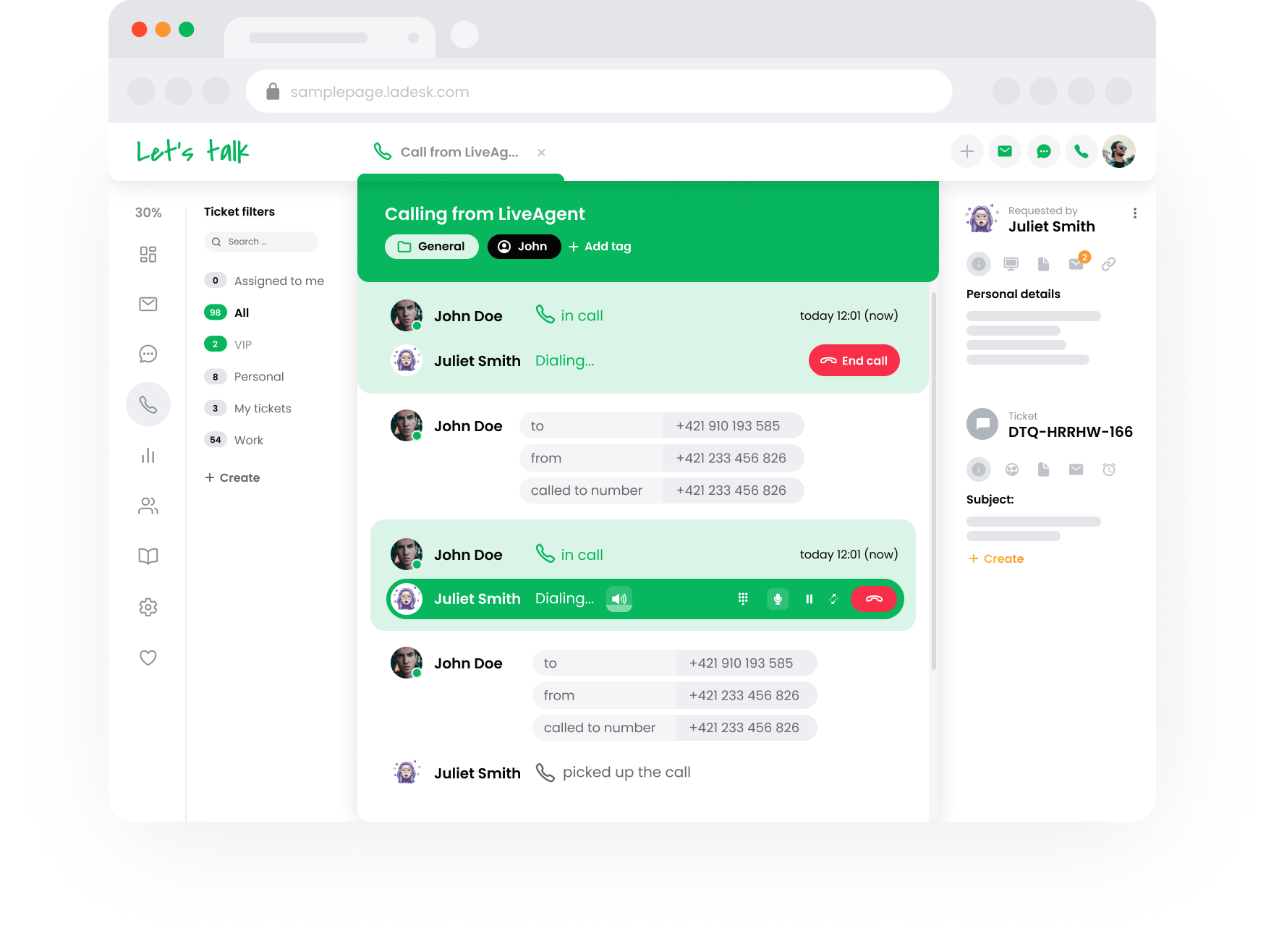
Conducting market research
Outbound call center agents often engage in market research activities. This research provides valuable data on consumer behavior, competitors’ analysis, and evolving market trends. This information aids company executives in making insightful business decisions, such as rolling out new products, updating existing services, and addressing customer pain points.
To conduct market research efficiently, call center agents often use outbound call center software that features call recordings, auto-dialing technology, and other automation functions. All of these call center features enable agents to make hundreds of automated outbound calls daily, without losing precious time on dialing and manually logging all the call details.

Upselling and cross-selling
Call center representatives are often urged to recognize and utilize potential opportunities for upselling and cross-selling during customer interactions. Upselling involves a call center agent highlighting a product or service of higher value or additional benefits to a customer.
On the other hand, cross-selling entails an agent encouraging a customer to buy a product or service that complements or relates to their existing purchase. Going beyond standard communication scripts, cross-selling or upselling necessitates that agents demonstrate flexibility, creativity, and a unique approach to each customer.
Agent’s daily outbound duties:
- Making outbound calls
- Conducting market research
- Upselling and cross-selling
An example of an outbound call center representative’s workday
Matthew, an outbound call center representative at a tech company, begins his day by checking the list of targeted clients he needs to call for the day.
Utilizing the auto-dialer function, he reaches out to clients and potential customers, with the objective to sell the company’s newly developed software. During these calls, he collects crucial information about customers’ tech requirements and preferences for market research. Later, the collected data aids the company management in fine-tuning their current offerings and developing new ones.
Whenever Matthew interacts with an existing client, he keenly identifies potential opportunities to upsell a premium version of the software or cross-sell an added warranty service. This way, his daily duties significantly contribute to the firm’s product counsel, customer insight, and overall revenue.
On-site duties
On-site duties of a call center agent involve managing and maintaining administrative tasks within the call center.
Managing and updating customer databases
Among the most common administrative responsibilities is reviewing and updating the customer relationship management (CRM) system. CRM serves as a contact center database, storing all the available customer data, including contact details, purchase and interaction history, billing and shipping preferences, and more. All agents have access to this data, so they can use it during customer service calls. To provide effective and personalized customer service, all of this information needs to be up-to-date.
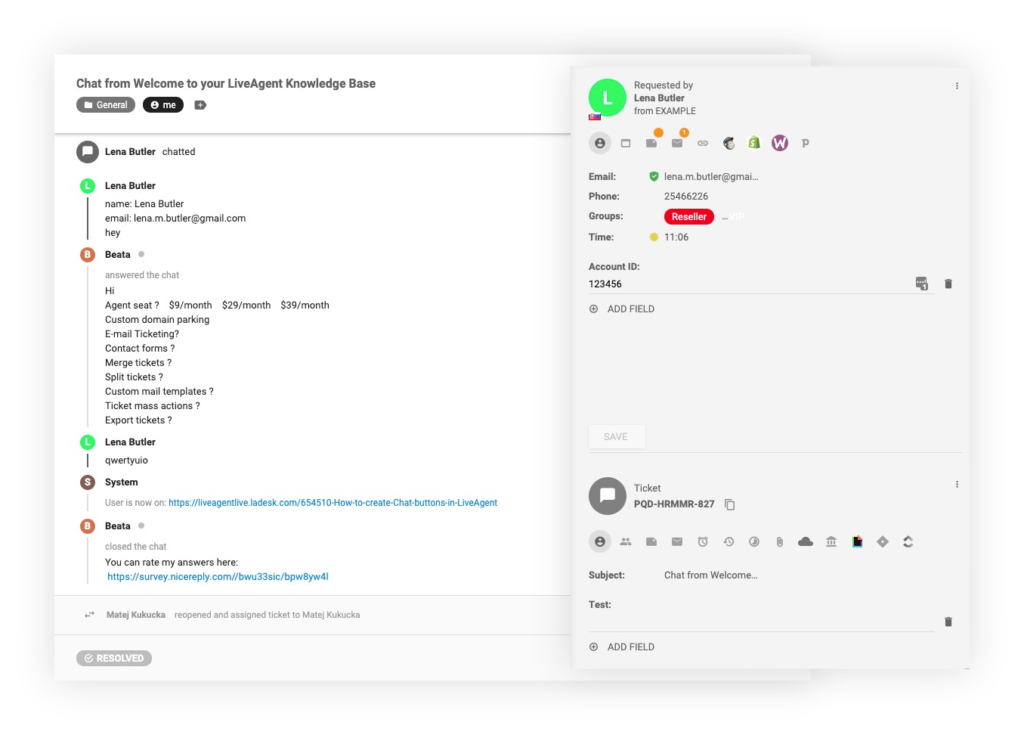
Collecting and reporting on customer feedback
Often, the only direct human interaction a business has with its customers comes through call center agents. These agents therefore represent a crucial channel for gathering vital customer feedback and communicating it to upper management.
By engaging in direct, real-time telephone conversations with customers, these agents gain valuable insights into customers’ perceptions about the company’s products or services. They learn about the challenges the customers face and get their suggestions on how the business can enhance its offerings to better align with their expectations.
Training and onboarding new call center agents
Call center representatives may also participate in initiatives managing personnel, such as the training and integration of new colleagues into the customer service team. To be effective and productive, representatives should possess a thorough understanding of the company’s product or service, its culture, and its policies.
A comprehensive knowledge of the call center software they utilize is also crucial to maintain operational efficiency. When new team members are brought in, the training and technical onboarding is typically overseen by the call center manager and experienced representatives.
Agent’s daily on-site duties:
- Updating customer databases
- Collecting and reporting customer feedback
- Reporting roadblocks and issues
- Onboarding new call center employees
An example of an on-site call center representative’s workday
Every morning, Alex, a call center agent for an online retail company, starts her day by logging into the company’s CRM software. She reviews and updates the CRM with new customer details and the most recent purchase history recorded from the previous day.
Throughout the day, she answers incoming calls, dealing directly with customers. She handles their inquiries, records their complaints, and receives their feedback on the company’s offerings. Every bit of information she gathers during these calls is entered into the CRM for future reference and to provide personalized service. She also reports key insights to the management team, such as repetitive complaints about a particular product.
Toward the end of her shift, Alex spends time with the newest team member, showing them how to navigate the CRM and explaining the company’s policies. Her day is filled with different tasks, all contributing to customer satisfaction and the smooth operation of the call center.
Call center representative salary expectations
A call center agent’s salary can vary widely depending on several factors, including years of experience, location, specific role, and the industry the call center services. Entry-level positions may start close to the minimum wage, particularly in areas with a lower cost of living. In contrast, experienced call center representatives, especially those in technical or specialized fields, can earn significantly higher wages.
Bonuses and commission structures can also significantly impact a call center agent’s salary. Some companies offer performance-based incentives that can substantially increase an agent’s earnings above their base salary.
Now, let’s talk some numbers.
Based on data gathered by Glassdoor, an average call center agent in the United States can anticipate an annual salary that typically falls between $39,709 and $43,780. This includes a base pay that ranges from $32,000 and $43,000, paired with an additional pay component of up to $2K – $4K. The additional pay encompasses perks such as a cash bonus, commission, tip or profit sharing.
Interestingly, the same research shows that AT&T comes up as the highest-paying company, offering their call center agents over $50K per year.
Essential skills and qualifications for call center representatives
Operating a successful call center can be a daunting task. That’s why we have a comprehensive call center requirements checklist of all the essential requirements that will guide you throughout the whole process.
However, in today’s article, it’s all about the call center staff. Below, we are going to look at all the skills and capabilities you need to possess to become a successful call center rep while feeling fulfilled in your job.
Must-have skills
- Effective communication skills: It is vital for a call center representative to articulate information clearly and confidently. They also need to understand and resolve customers’ issues efficiently, ensuring customer loyalty and satisfaction.
- Empathetic listening: One of the most important soft skills is the ability to really listen to your customers. By listening empathetically, a representative can better understand the customer’s perspective, validate their feelings, and effectively address their needs. This skill encourages patience and rapport building.
- Problem-solving skills: Representatives face various customer issues daily. They must have strong problem-solving skills to analyze situations, consider solutions, and resolve issues promptly to ensure customer satisfaction.
- Knowledge of product/service: An understanding of the product/service is crucial. It allows the agent to provide accurate information and handle inquiries or complaints effectively.
- Time management skills: Representatives often handle multiple calls simultaneously and need to resolve issues promptly. Excellent time management skills help in prioritizing tasks, reducing stress, and boosting productivity.
- Technical skills: Agents should be proficient in using various call center software tools or CRM systems to handle calls, track customer information and interact with customers effectively.
- Team player: A representative should have the ability to effectively work within a team. Excellent teamwork promotes a positive working environment, increases efficiency, and results in higher customer satisfaction rates.
- Patience: Dealing with frustrated customers can be challenging. Having patience helps to manage stress levels, maintain a calm demeanor, and ensure customer satisfaction.
- Adaptability: The call center environment can be fast-paced and ever-changing, requiring representatives to adapt quickly. This skill helps in dealing with abrupt changes, managing sudden influxes of calls, and adjusting to new procedures or technologies instantly.
Nice-to-have qualifications
- Multilingual ability: Being able to speak multiple languages is a significant advantage in a call center environment. This ability helps to communicate effectively with customers from different regions and backgrounds, meeting their needs in their preferred language and, in turn, enriching customer service experiences.
- Previous experience in customer service: While not always necessary, having prior experience in customer service can be beneficial because it provides a better understanding of how to handle customers effectively. The representative would be familiar with customer service protocols and handling difficult customers, thereby potentially reducing the training period.
- Higher education: Although usually not a requirement, possessing a degree in communication, business, or a related field can be a considerable plus. This educational background can offer better insight into corporate communication strategies and customer management, leading to more effective handling of customer questions and issues.
- Certifications in customer service or sales: While not compulsory, holding relevant certifications showcases a commitment to the field and indicates that the candidate has acquired a proven set of skills that go beyond the basic requirements for the role.
Experience requirements for call center representatives
The level of experience required can vary depending on the size and nature of the organization, as well as the complexity of the calls the agent will be handling. However, most employers require at least a high school diploma or equivalent and some experience in a customer service role.
Employers typically look for qualified candidates who can demonstrate strong verbal communication skills, both verbal and written. They should be able to display patience, empathy, and understanding when dealing with customers. They should also have a good working knowledge of basic software applications and any relevant CRM software.
Experience can be gained in a variety of ways: taking on entry-level customer service roles, participating in internships, or even volunteering at organizations that require a lot of customer interaction. Online courses or certificates in customer service or communication can also be beneficial for honing relevant call center agent skills.
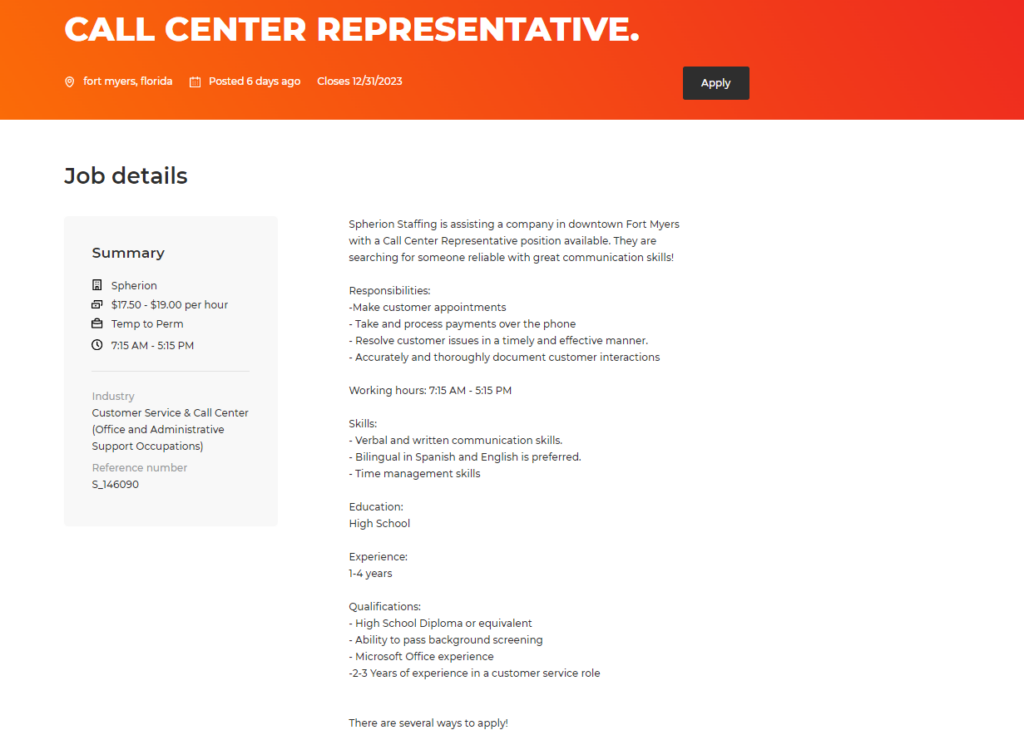
In the next section, we will delve deeper into how one can gain relevant experience efficiently and the steps to take in order to become an effective call center representative.
Education and training tips for call center representatives
The job of a call center representative requires some specific skills and educational standards. In the United States, the minimum educational requirement is often a high school diploma or equivalent.
However, certain advanced positions may require a bachelor’s degree or some relevant coursework, depending on the complexity of the customer service role. Excellent communication skills, both verbal and written, fluency in the English language, and basic computer skills are often a prerequisite too.
Supplementary training programs are critical for your further skill growth. They are typically provided by employers, but can also be pursued independently. These programs may cover areas such as handling difficult customers, effective communication techniques, software applications used in CRM, call handling protocols, and more.
There are notable online platforms offering comprehensive call center training programs, often led by industry experts:
- Coursera
- Udemy
- edX
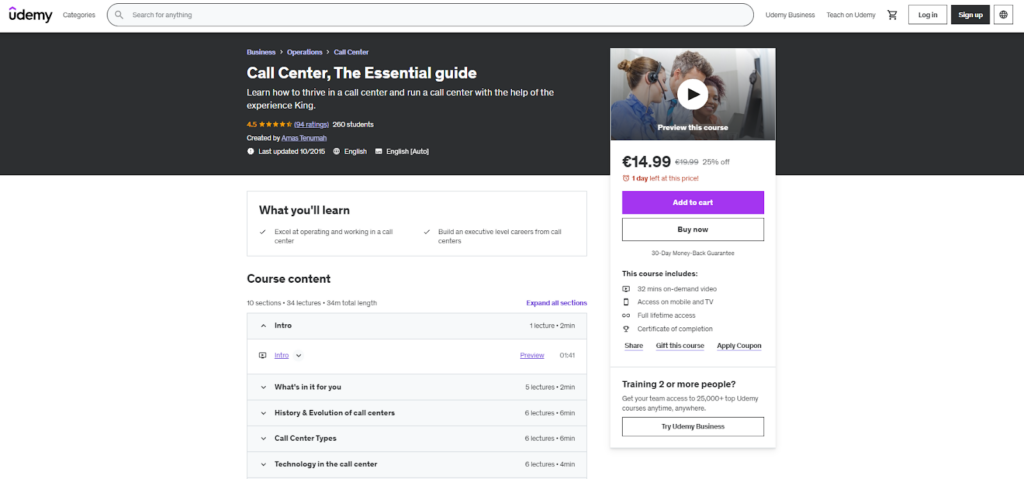
These platforms cater to both beginners and advanced learners, and often provide certificates upon course completion.
In addition to these, gaining a professional certification can enhance a representative’s recognition and credibility. For example, HDI’s Customer Service Representative (CSR) Certification and ICMI’s Certified Contact Center Professional (CCCP) are widely recognized in the industry.
Moreover, if you are interested in learning about the specific skills needed to be a successful call center representative, we have a separate article further discussing call center skills that delves into it comprehensively.
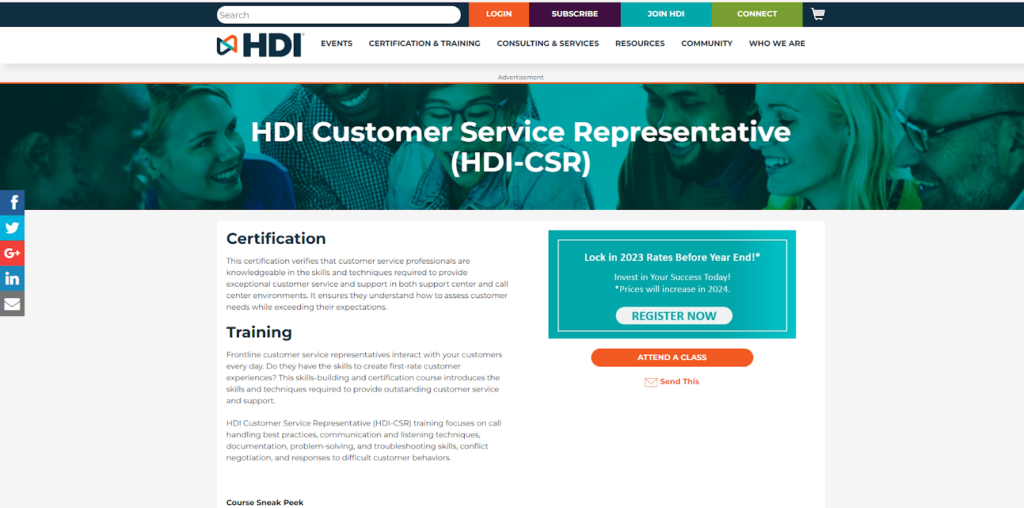
The learning process for a call center representative is continuous and involves active engagement with industry trends and customer service best practices.
Here are a few ways you can go the extra mile to excel in your career in customer service:
- Join industry webinars and workshops: Many companies and industry experts host webinars and workshops that can provide valuable insights into the latest trends in the call center realm.
- Follow industry blogs and podcasts: There are numerous educational blogs and podcasts dedicated to call center industries. Following them can provide a continuous stream of current information and insights.
- Participate in professional development programs: These are offered by an employer or industry trade groups, which often cover emerging trends and challenges in the industry.
- Engage with social media: Follow industry leaders, influencers, and professionals on platforms like LinkedIn, X (Twitter), and other social media platforms. They often share industry insights and the latest news.
- Utilize networking: Attend industry networking events, workshops, conferences, etc., to meet professionals and share ideas and knowledge.
- Subscribe to newsletters: They are often free and packed with the latest information, reports, and data.
- Participate in industry forums and groups: Online communities, forums, and groups offer a platform where professionals can ask questions, share knowledge, and discuss the latest happenings in their industry.
Remember, the most successful call center representatives are those who view their role as more than a job – it’s a craft that requires continuous learning and refinement. With the right mix of education, training, and constant learning, you can certainly excel in a customer support role.
Conclusion
The role of a call center representative is vital in maintaining the reputation of a company while ensuring customer satisfaction. The duties of this role vary from handling incoming and outgoing calls, providing information, troubleshooting issues, processing orders and payments, and working closely with other departments.
A successful call center representative needs to possess excellent communication skills, problem-solving abilities, thorough product knowledge, excellent time management, and much more. These are significantly complemented with a sound educational background and relevant job experience.

To further enrich your experience in the field, adopting software tools such as LiveAgent can significantly boost efficiency and productivity in customer service operations. Experience LiveAgent’s comprehensive software designed for smoother calls, efficient ticketing, and effective customer service management with its 30-day free trial.
Don't keep success on hold!
Dial up your service capacity with LiveAgent's call center software. Sign up today and exceed all your customers’ expectations!
Frequently Asked Questions
How do you become a good call center agent?
Anyone can become a good call center agent with patience and training. Success depends on both basic and advanced theoretical learning and practical experience. Gaining experience, learning from mistakes, and refining tone and language are vital. Additionally, working consciously to identify and address pain points, and discovering new solutions, is essential for overcoming challenges and excelling in the call center environment.
What are the duties and responsibilities of call center agents?
Online call center agents must be immediately available to assist customers who contact them. Their responsibilities encompass answering calls, providing information, assisting with shopping, troubleshooting issues, or even serving as a mediator between the customer and another employee of their company. Call center agent jobs are dynamic, so it’s important to be ready for any situation.
Which skills are important for a call center agent?
Call center agents need to have a flexible communication style and detailed knowledge of the products or services. Knowing how to adjust your communication tone and style for various customers is also a great skill to have. Proficiency with contact center technologies is essential, including efficiently navigating knowledge bases, seeking assistance from colleagues, and managing various processes to aid customers.
Can I work in a call center without experience?
Yes, you can work in a call center without experience. Many call centers offer training for new hires. When applying, highlight transferable skills like communication and customer service. Previous roles in customer-facing sectors can be beneficial. Emphasizing qualities like patience and empathy can also boost your chances of getting the job.
Customer service vs. customer support: Differences and tips
Discover the key differences between customer service and support, essential for boosting satisfaction and loyalty. Get expert tips now!
Understand call centers: function, benefits, and ROI impact
Discover the ins and outs of call centers, their benefits, common challenges, best practices, and future trends that can shape the industry.
Understand call centers: function, benefits, and ROI impact
Streamline customer support with LiveAgent's call center. Easy setup, advanced features, free trial & budget-friendly plans. Try now!"

 Български
Български  Čeština
Čeština  Dansk
Dansk  Deutsch
Deutsch  Eesti
Eesti  Español
Español  Français
Français  Ελληνικα
Ελληνικα  Hrvatski
Hrvatski  Italiano
Italiano  Latviešu
Latviešu  Lietuviškai
Lietuviškai  Magyar
Magyar  Nederlands
Nederlands  Norsk bokmål
Norsk bokmål  Polski
Polski  Română
Română  Русский
Русский  Slovenčina
Slovenčina  Slovenščina
Slovenščina  简体中文
简体中文  Tagalog
Tagalog  Tiếng Việt
Tiếng Việt  العربية
العربية  Português
Português 







